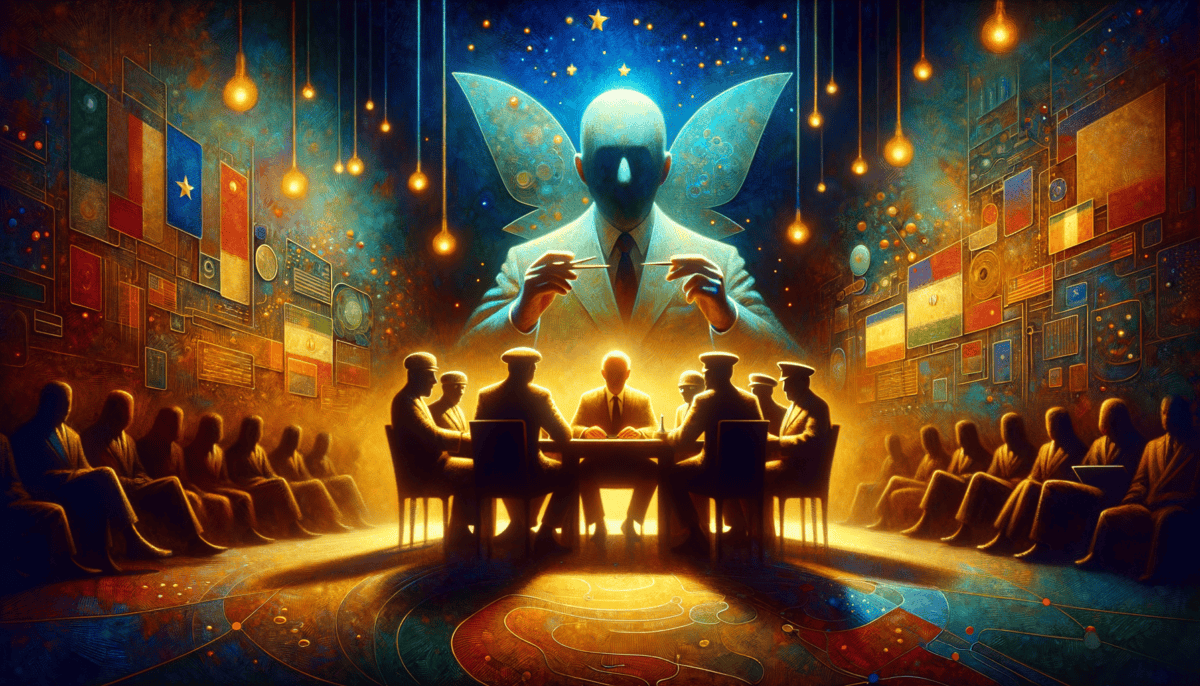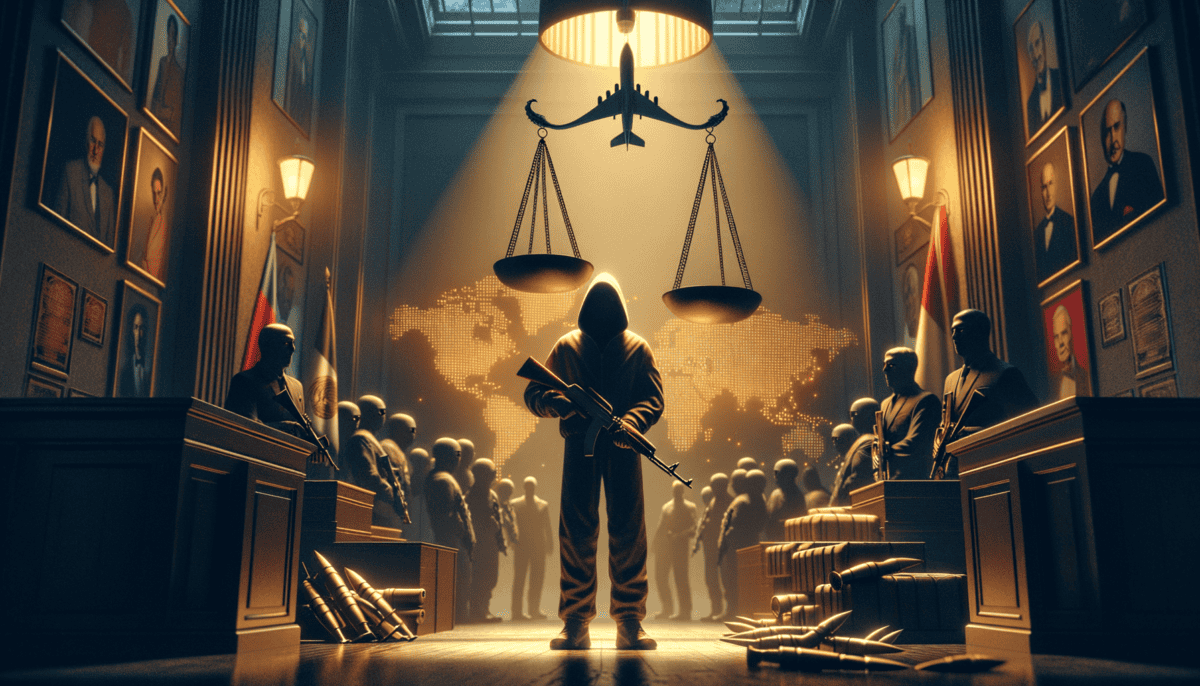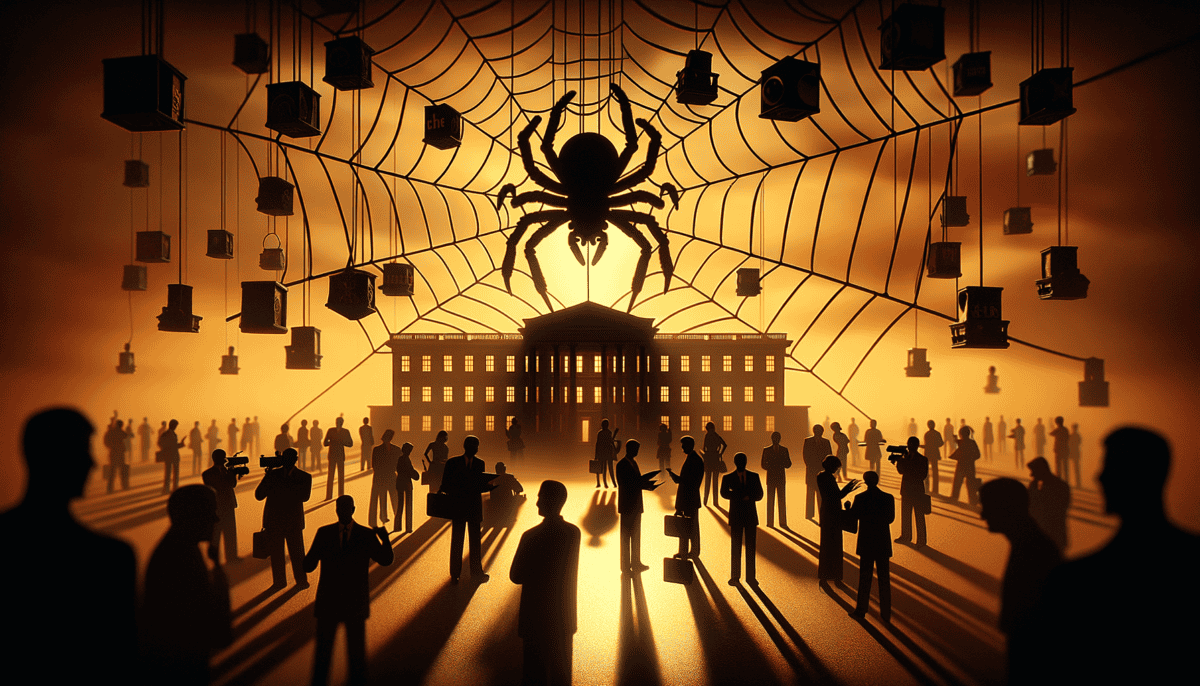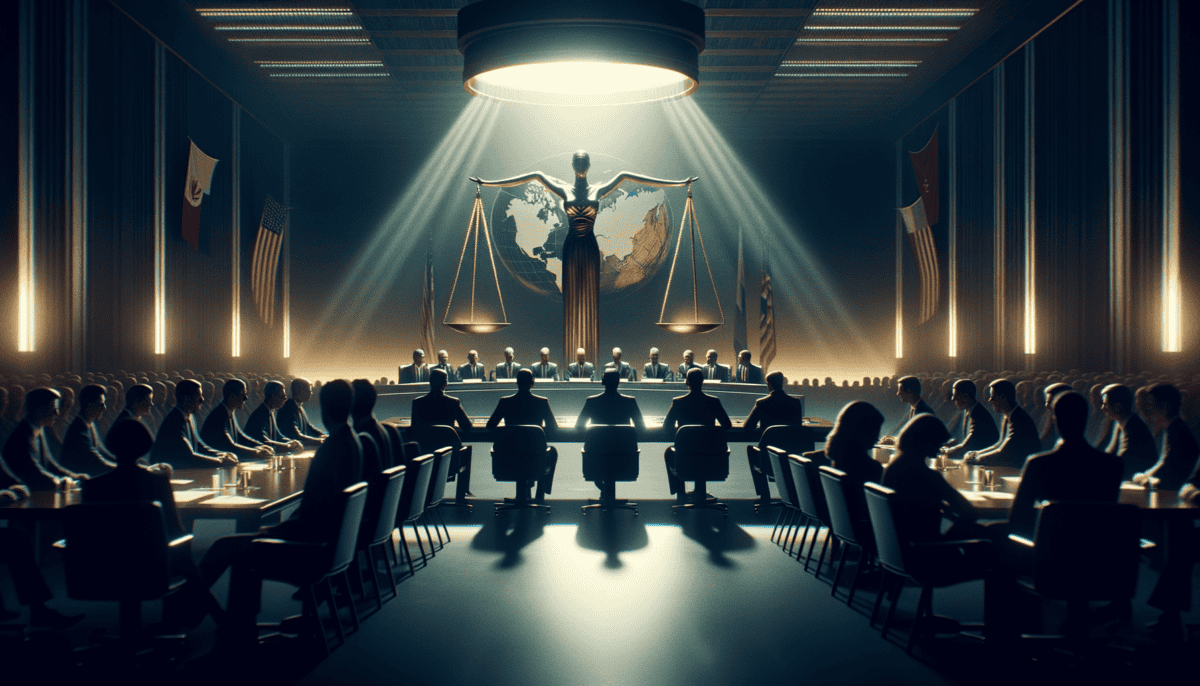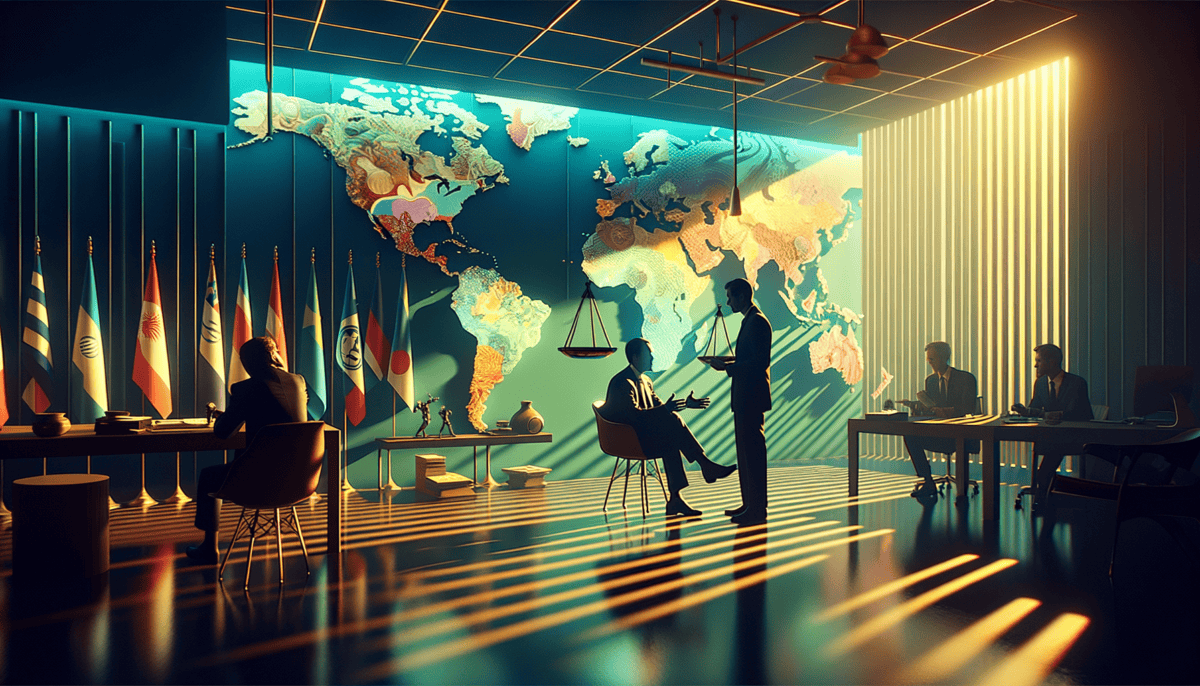The Cold War’s Hidden Chessboard
The White House glowed softly in the autumn twilight of 1981. Inside the Oval Office, President Ronald Reagan sat at his desk, his brow furrowed with worry. The world was changing fast, and America needed to keep up.
"Mr. President," said a young Marine lieutenant colonel named Oliver North, standing straight in his crisp uniform. "We have a situation in Central America that needs your attention."
Reagan looked up from his papers. The TV news had been full of stories about a place called Nicaragua, where people called the Sandinistas had taken over. They were friends with America's biggest worry – the Soviet Union.
"Tell me more, Oliver," Reagan said, leaning forward in his chair.
North spread a colorful map across the president's desk. "Sir, the Soviets are trying to make more friends in our backyard. They're sending help to Nicaragua, and we think they might try to spread their ideas to other countries nearby."
The president nodded slowly. He remembered how scared people were of the Soviet Union. It was like two big kids on a playground, each trying to get more friends on their side. The U.S. was one kid, and the Soviet Union was the other.
“We can’t let them get stronger in Central America,” Reagan said firmly. “What are our options?”
North pointed to groups on the map called the Contras. They were fighting against the Sandinistas, but they needed help. The problem was, giving them help wasn't easy – there were lots of rules about how America could spend its money.
Here's what made things tricky:
- Congress had strict rules about helping groups like the Contras
- The Soviet Union was getting stronger in Nicaragua
- Many Americans were worried about getting into another war
- The president wanted to stop Soviet influence from spreading
The meeting lasted late into the evening. As the sun set over Washington, decisions were being made that would change history. Nobody in that room knew they were about to start one of the biggest secret plans America had ever seen.
Outside the White House, regular Americans were going about their lives. They had no idea that in the highest office in the land, a plan was forming – a plan that would later become known as the Iran-Contra Affair.
Lieutenant Colonel North left the White House that evening with a mission. He would become the key player in a secret plan that would connect three very different parts of the world: America, Nicaragua, and a country called Iran.
The chess pieces were being set up, but this wasn't going to be any ordinary game. It was going to be played in the shadows, away from public view, with consequences nobody could predict.
As autumn turned to winter in Washington, the wheels were already in motion. Some people would become heroes, others would face big trouble, and everyone would learn important lessons about following the rules – even when trying to do what they thought was right.
Rain fell softly on the White House windows as the lights in the Oval Office finally went dark. Tomorrow would bring new challenges, new secrets, and the start of an adventure that would keep people talking for years to come.
Secret Deals in Dark Times
The year was 1984, and a brutal war was raging between Iran and Iraq. Lieutenant Colonel Oliver North sat in his Pentagon office, staring at a coded message that had just arrived.
“We have an opportunity,” the message read. “Iran needs weapons. They’re willing to pay.”
North picked up his secure phone and dialed a number he knew by heart. “Sir, I think I found a way to help our friends in Nicaragua.”
In a small room somewhere in Washington, a group of people gathered around a table. Maps and papers covered every inch. They weren’t supposed to be meeting like this, but they thought they had no choice.
“Here’s how it works,” North explained, drawing on a whiteboard:
• They pay us more than the weapons cost
• We use the extra money to help the Contras
• Nobody finds out
The room grew quiet. What they were planning wasn’t allowed. Congress had made rules about selling weapons to Iran and helping the Contras. But these men thought they had found a clever way around those rules.
“What about Israel?” someone asked. “They could help us move the weapons.”
North nodded. “Yes, they’ll be our middle man. Iran won’t buy directly from us.”
Meanwhile, in Iran, leaders were desperate. They needed parts for their weapons to fight Iraq. They didn’t like America much, but they needed help.
An Iranian leader looked out his window at Tehran’s busy streets. “The Americans want to deal?” he asked his advisor.
“Yes, through Israel. And they say they might help us get some of our people back too.”
Back in Washington, the secret meetings continued. They used special code words:
“The cucumber shipment is ready” meant weapons were ready to send.
“The garden is growing” meant money was coming in.
“Birds are flying south” meant the Contras got their help.
But secrets this big are hard to keep. Some people started asking questions:
“Why are Israeli planes flying to Iran?”
“Where are the Contras getting their new equipment?”
“Who’s really in charge of all this?”
North wrote in his private notebook one night: “The plan is working, but for how long? Every day more people know. Every day is another chance for something to go wrong.”
He was right to worry. In a small office in Lebanon, a magazine writer was starting to put pieces together. And in Congress, some lawmakers were asking why certain numbers didn’t add up.
The clever plan that seemed perfect in that small Washington room was about to face its biggest test. The chess game was getting more complicated, and some of the pieces were starting to wobble.
As spring turned to summer in 1985, nobody knew that their secret was like a balloon getting bigger and bigger. Soon, it would either have to come down to earth – or pop.
Rules Are Made to Be Broken
In a brightly lit office on Capitol Hill, Congressman Edward Boland looked worried. He held up a piece of paper – a law he wrote himself. The Boland Amendment was meant to stop money from going to the Contras in Nicaragua.
“No money shall help the Contras fight. That’s what the law says, plain and simple,” Boland said to his assistant.
But Oliver North had other ideas. In his White House office, he spread out a map of Central America. Red lines showed how money could move without anyone seeing it.
North picked up his phone. “General Secord? We need to talk about our ‘Enterprise.'” That was their special name for their secret plan.
Richard Secord, a retired Air Force general, knew how to move money without leaving traces. He used special bank accounts in different countries:
• Panama – where rules were loose
• The Cayman Islands – far from prying eyes
“It’s like a maze,” Secord explained to North. “The money goes in here, turns left, turns right, and comes out somewhere else. Nobody can follow it.”
But some people weren’t so sure. A young clerk in the State Department noticed strange numbers in some reports. She wrote in her diary:
“Something’s not right. The numbers don’t match. Where is all this extra money coming from? Where is it going?”
Meanwhile, in Nicaragua, the Contras suddenly had new rifles, new trucks, and plenty of supplies. Their leader smiled as he watched boxes being unloaded from unmarked planes. ️
Back in Washington, North’s secretary, Fawn Hall, was busy with special papers. Some she typed up. Some she shredded. Some she smuggled out in her boots.
“Miss Hall,” North said one day, “we’re doing what’s right for our country. Remember that.”
But the clever maze of money was getting more complicated. Like a spider web growing bigger and bigger, it was harder to keep track of all the threads.
One rainy evening, North looked out his White House window. The city lights twinkled below. He thought about all the secrets he was keeping:
“The weapons going to Iran…”
“The money coming back…”
“The help going to the Contras…”
He didn’t know that in another part of Washington, someone had found a piece of paper that shouldn’t have existed. Like a loose thread on a sweater, if someone pulled it, the whole thing might start to unravel.
As summer turned to fall in 1986, storm clouds were gathering. The clever plan to work around Congress’s rules was about to face its biggest test. And some people were starting to ask questions that nobody wanted to answer.
Secrets Start to Spill
On a chilly October morning in 1986, a small cargo plane crashed in the jungles of Nicaragua. ️ Among the wreckage, someone found something they weren’t supposed to see – papers with phone numbers that led straight back to the White House.
“This is bad, very bad,” Oliver North whispered into his secure phone. His hands were shaking as he held a newspaper. The headline screamed: “MYSTERIOUS PLANE CRASH RAISES QUESTIONS.”
In newsrooms across America, reporters started digging. Like detectives following clues, they found more and more strange things:
– Weird plane flights at night
– Money appearing from nowhere
– Secret meetings in faraway places
Robert Parry, a brave reporter, got an important phone call late one night. The voice on the other end was nervous:
“Look into the weapons going to Iran. Follow the money. It’s all connected.”
Meanwhile, in the White House, people were starting to panic. Fawn Hall, North’s secretary, worked faster than ever:
But some papers had already escaped. Like leaves blown by the wind, they landed on reporters’ desks. A Lebanese newspaper called “Al-Shiraa” printed a big story about American weapons going to Iran.
President Reagan was worried. He went on TV to talk to the American people:
“My fellow Americans,” he said, looking straight into the camera, “The stories about arms for hostages are not true.”
But more secrets kept coming out. Each day brought new surprises:
The news made people angry. Congress wanted answers:
“Who knew about this?”
“Who gave the orders?”
“Where did the money go?”
Oliver North tried to stay calm, but inside he was worried. His clever plan was falling apart. People he trusted were starting to talk to save themselves.
“Sir,” his new secretary said one morning, “there are reporters outside. Lots of them. And they have cameras.”
The public was shocked. How could their government break its own rules? Even kids at school were talking about it:
Congress decided it was time for a big investigation. They would make people come and tell the truth – on TV where everyone could watch.
As November turned to December, Oliver North looked out his window one last time. The same city lights twinkled below, but everything had changed. Soon he would have to explain himself to the whole country.
In newsrooms, courtrooms, and living rooms across America, people waited to hear the full story. The biggest political mystery of the 1980s was about to be solved, and nobody would like the answers.
Truth and Consequences
The summer of 1987 was hot in Washington D.C., but inside the air-conditioned hearing room, Colonel Oliver North felt a chill. ️ Cameras clicked and whirred as he walked to his seat, wearing his Marine uniform covered in medals.
“Please raise your right hand,” said Senator Daniel Inouye. “Do you swear to tell the truth, the whole truth, and nothing but the truth?”
Oliver North stood tall and proud. “I do,” he said, his voice strong and clear.
People stopped working to see the hearings on TV. Even soap operas were canceled!
North began telling his story. He spoke about helping the Contras when Congress said not to:
Some people thought North was a hero. They sent him thousands of letters:
“Dear Colonel North,
You’re so brave! Thank you for protecting America!
From, Tommy (age 10)”
Others were angry. They didn’t like that he broke the rules:
Fawn Hall, North’s secretary, also had to tell her story. She described shredding papers and sneaking documents out of the office in her boots:
“Sometimes you have to go above the written law,” she said, making many people gasp.
The questions kept coming for days:
“Who knew about the plan?”
“Why didn’t you tell Congress?”
President Reagan watched from the White House. He looked tired and sad as he wrote in his diary:
“I never meant for any of this to happen. Maybe I should have paid more attention.”
The hearings showed how complicated everything was. Some people had tried to do good things but did them in wrong ways. Others had gotten caught up in lies that grew bigger and bigger.
After six weeks of hearings, fourteen people got in trouble with the law. Some went to jail, though President Bush later forgave them.
The country learned important lessons:
Secret plans usually lead to trouble.
The truth comes out sooner or later.
As summer turned to fall, the hearings ended. But the story wasn’t over. Many questions remained, and the country had changed. People didn’t trust their government as much anymore.
Oliver North walked out of the hearing room for the last time. Camera lights flashed around him like lightning. The truth had come out, but at what cost? The answer would take years to understand.
A Nation Forever Changed
The morning sun filtered through the White House windows as President Reagan sat at his desk in late 1988. His presidency was ending, but the shadow of Iran-Contra still lingered.
“I wonder if history will understand what we tried to do,” Reagan wrote in his diary that morning.
Down the street, Oliver North was packing his office. The medals on his uniform seemed heavier now. He picked up a photo of his Marine days:
“We thought we were doing the right thing,” he whispered to himself. “Maybe we forgot that how you do things matters as much as why.”
The effects of Iran-Contra spread far and wide:
• The Reagan team lost people’s trust
• Congress made stricter rules about secret operations
• The White House had to be more open about what it did
In Nicaragua, a young boy named Carlos looked at the rusty weapons left behind:
Back in Washington, new rules changed how the government worked:
– Presidents must tell Congress about secret plans
– Money must be tracked carefully
– Nobody can make their own foreign policy
Years later, Oliver North spoke to a classroom of students:
“Sometimes,” he told them, “trying to do good things in the wrong way can hurt more than help. That’s what we learned.”
The Iran-Contra story taught America big lessons:
2. Telling the truth is important
3. Secret plans usually cause trouble
4. Everyone must follow the law
Former Secretary of State George Shultz shared his wisdom:
“In a democracy, the ends don’t justify the means. How we do things is as important as what we do.” ⚖️
Today, the Iran-Contra story helps us remember important things:
– Breaking rules hurts everyone
– The truth always comes out
– Our country is stronger when we follow the law
As the sun sets on this story, we remember that America learned and grew stronger. The mistakes of Iran-Contra helped make better rules and a more open government.
And that’s how the Iran-Contra story changed America forever, reminding us that in a democracy, doing things the right way matters just as much as doing the right things.


